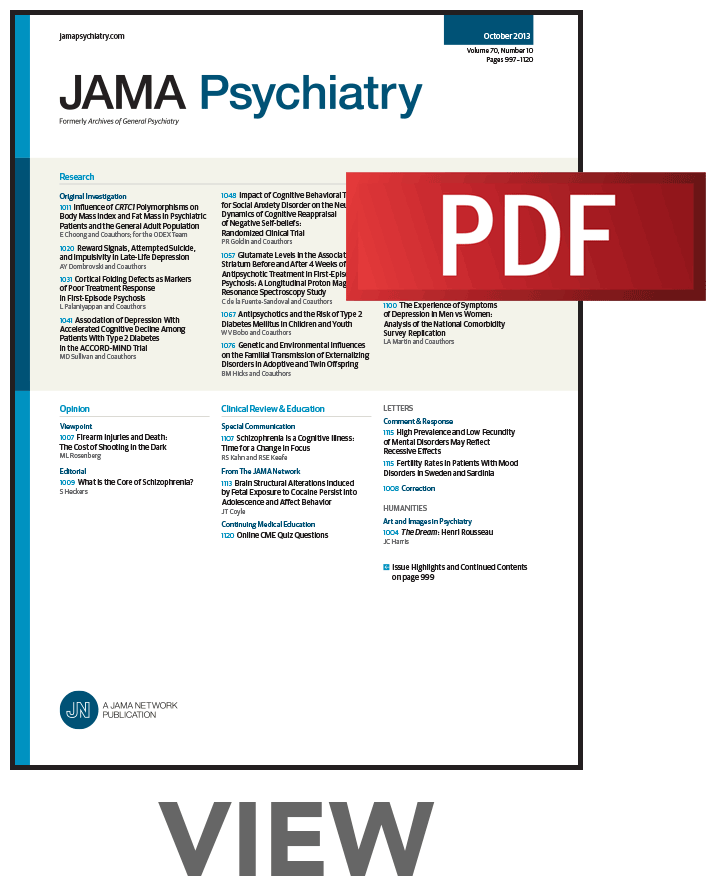Current Position and Future Direction of Inflammation in Neuropsychiatric Disorders: A Review.
IF 17.1
1区 医学
Q1 PSYCHIATRY
引用次数: 0
Abstract
Importance There has been a large increase in research focusing on inflammation across psychiatric disorders, with the hope of achieving breakthroughs seen with this approach in cancer and other conditions. Current findings suggest that immune-related pathophysiological processes involving inflammation could play a key role for many major mental illnesses. How far reaching this role would be and how soon we can expect translation into treatment, however, remain open questions. Observations In this narrative review, new evidence from clinical populations, new trials, and preclinical models was summarized. Converging evidence suggests that inflammation plays a significant role in subgroups of patients with psychosis, depression, and autism. Interleukin (IL) 6, T-cell control, immune-metabolic function, and the complement system represent fundamental areas of further research. New treatments have yet to reach clinical impact, but targeted trials are ongoing. Developing and refining human cellular models will aid mechanistic target validation and further understanding of causal pathways and networks. Conclusions and Relevance To advance to and achieve clinical impact, investigations need to include a collaborative, united effort, pulling information across disciplines and translational scales. A focused approach is needed to validate key emerging targets, where evidence and potential for new and repurposed treatments are strongest.炎症在神经精神疾病中的地位和未来方向:综述。
重点关注精神疾病炎症的研究大幅增加,希望在癌症和其他疾病中实现这种方法的突破。目前的研究结果表明,涉及炎症的免疫相关病理生理过程可能在许多重大精神疾病中发挥关键作用。然而,这一作用的影响范围有多广,以及我们能在多快的时间内将其转化为治疗方法,仍然是一个悬而未决的问题。在这篇叙述性综述中,总结了来自临床人群、新试验和临床前模型的新证据。越来越多的证据表明,炎症在精神病、抑郁症和自闭症患者的亚群中起着重要作用。白细胞介素(IL) 6、t细胞控制、免疫代谢功能和补体系统是进一步研究的基础领域。新的治疗方法尚未达到临床效果,但有针对性的试验正在进行中。发展和完善人类细胞模型将有助于机制靶标验证和进一步了解因果途径和网络。结论和相关性为了推进和实现临床影响,研究需要包括协作,联合努力,跨学科和转化尺度提取信息。需要一种有重点的方法来验证关键的新兴目标,在这些目标中,新的和重新利用的治疗方法的证据和潜力是最强的。
本文章由计算机程序翻译,如有差异,请以英文原文为准。
求助全文
约1分钟内获得全文
求助全文
来源期刊

JAMA Psychiatry
PSYCHIATRY-
CiteScore
30.60
自引率
1.90%
发文量
233
期刊介绍:
JAMA Psychiatry is a global, peer-reviewed journal catering to clinicians, scholars, and research scientists in psychiatry, mental health, behavioral science, and related fields. The Archives of Neurology & Psychiatry originated in 1919, splitting into two journals in 1959: Archives of Neurology and Archives of General Psychiatry. In 2013, these evolved into JAMA Neurology and JAMA Psychiatry, respectively. JAMA Psychiatry is affiliated with the JAMA Network, a group of peer-reviewed medical and specialty publications.
 求助内容:
求助内容: 应助结果提醒方式:
应助结果提醒方式:


